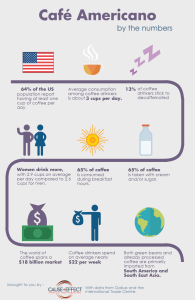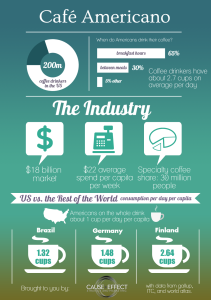Coffee Is the Most Significant Food Import into the U.S.
Nearly two-thirds of the US population drinks coffee. According to research from Gallup, about a quarter of coffee drinkers even identify as addicted. So where is our much needed coffee coming from? Could anything stand in the way of our fix?
Coffee is the most significant food import of the United States. Although we export some of the refined product too, the ITC claims the US stake in global gross imports amounted to as much as 18.8% in 2009. The rest of the world has been slowly building a thirst as well but demand in the US has remained steady enough to sustain an $18 billion industry, the breadth of which includes retail and the rise of specialty drinks.
Coffee imports consist of both green and processed beans. According to 2015 data from the USDA, 30% of our supply comes from Brazil, 21% from Colombia, and 13% from Vietnam. While Colombia and Vietnam concentrate primarily on farming and harvesting green beans, other places like Mexico, Canada, and various EU countries specialize in processing the product for consumer consumption. Brazil, on the other hand, invests significantly and occupies a major market share in both halves of the industry.
What happens, though, when giants like Brazil face disruptions in environmental conditions? Coffee is first and foremost an agricultural product subject to years with good yields and low yields like any other crop. Brazil in particular has been experiencing below average rainfall and above average temperatures, feeling the consequences in its agricultural sector. Luckily, the USDA reports that dips in recent years in coffee production from our usual suppliers have been offset by expanded production from up-and-coming suppliers like Indonesia and Honduras. How reliable these windfall sources will be remains to be seen. So long as climate changes are a factor, we can expect to worry about our next coffee fix.
Please click on the infographics for additional insight related to this post.

Anoosha Anvari


